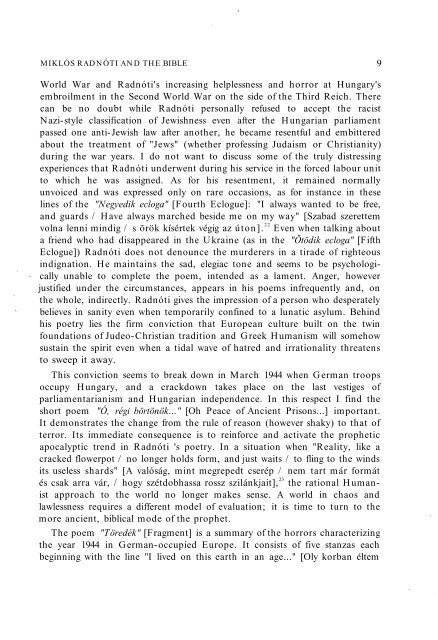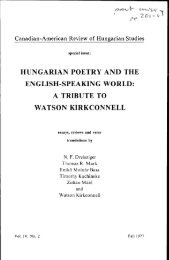HUNGARIAN STUDIES 11. No. 1. Nemzetközi Magyar ... - EPA
HUNGARIAN STUDIES 11. No. 1. Nemzetközi Magyar ... - EPA
HUNGARIAN STUDIES 11. No. 1. Nemzetközi Magyar ... - EPA
- No tags were found...
You also want an ePaper? Increase the reach of your titles
YUMPU automatically turns print PDFs into web optimized ePapers that Google loves.
MIKLÓS RADNÓTI AND THE BIBLE 9World War and Radnóti's increasing helplessness and horror at Hungary'sembroilment in the Second World War on the side of the Third Reich. Therecan be no doubt while Radnóti personally refused to accept the racistNazi-style classification of Jewishness even after the Hungarian parliamentpassed one anti-Jewish law after another, he became resentful and embitteredabout the treatment of "Jews" (whether professing Judaism or Christianity)during the war years. I do not want to discuss some of the truly distressingexperiences that Radnóti underwent during his service in the forced labour unitto which he was assigned. As for his resentment, it remained normallyunvoiced and was expressed only on rare occasions, as for instance in theselines of the "Negyedik ecloga" [Fourth Eclogue]: "I always wanted to be free,and guards / Have always marched beside me on my way" [Szabad szerettemvolna lenni mindig / s őrök kísértek végig az úton]. 22Even when talking abouta friend who had disappeared in the Ukraine (as in the "Ötödik ecloga" [FifthEclogue]) Radnóti does not denounce the murderers in a tirade of righteousindignation. He maintains the sad, elegiac tone and seems to be psychologicallyunable to complete the poem, intended as a lament. Anger, howeverjustified under the circumstances, appears in his poems infrequently and, onthe whole, indirectly. Radnóti gives the impression of a person who desperatelybelieves in sanity even when temporarily confined to a lunatic asylum. Behindhis poetry lies the firm conviction that European culture built on the twinfoundations of Judeo-Christian tradition and Greek Humanism will somehowsustain the spirit even when a tidal wave of hatred and irrationality threatensto sweep it away.This conviction seems to break down in March 1944 when German troopsoccupy Hungary, and a crackdown takes place on the last vestiges ofparliamentarianism and Hungarian independence. In this respect I find theshort poem "Ó, régi börtönök..." [Oh Peace of Ancient Prisons...] important.It demonstrates the change from the rule of reason (however shaky) to that ofterror. Its immediate consequence is to reinforce and activate the propheticapocalyptic trend in Radnóti 's poetry. In a situation when "Reality, like acracked flowerpot / no longer holds form, and just waits / to fling to the windsits useless shards" [A valóság, mint megrepedt cserép / nem tart már formátés csak arra vár, / hogy szétdobhassa rossz szilánkjait], 23the rational Humanistapproach to the world no longer makes sense. A world in chaos andlawlessness requires a different model of evaluation; it is time to turn to themore ancient, biblical mode of the prophet.The poem "Töredék" [Fragment] is a summary of the horrors characterizingthe year 1944 in German-occupied Europe. It consists of five stanzas eachbeginning with the line "I lived on this earth in an age..." [Oly korban éltem
















